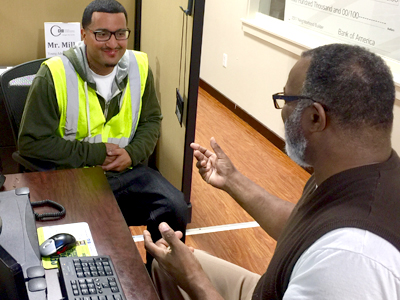
Oakland nonprofit Center for Employment Opportunities (CEO), an organization that works to reduce the rate at which convicted criminals reoffend, has been getting attention for its unique approach that provides ex-offenders with immediate employment.
CEO works with people immediately after they are released from prison, providing transitional temporary paid work while simultaneously providing weekly job coaching for placement with a full-time employer. Nearly 25 percent of CEO participants are Hispanic.
“CEO has helped me a lot,” says Eduardo Zavala of Oakland. “A lot of people say it’s hard to find a job, but it’s not true. If you really want to work, you can find work.”
In August 2011, CEO opened its first California office in Oakland, working in partnership with the California Department of Corrections, CalTrans, the City of Oakland, and the Roberts Enterprise Development Fund. Initially serving approximately 150 Oakland parolees per year, the office has grown to become CEO’s largest outside of New York City.
CEO stands out among other programs as it offers on-the-spot transitional work for its participants so they do not have to wait to get a job. In addition to this immediate transitional work, CEO simultaneously provides job coaching or training to participants for placement with a full-time employer. CEO works with 61 local Bay Area employers in addition to national partnerships.
The transitional work CEO participants do is through partnerships with the California Department of Transportation (Caltrans) and the Oakland housing Authority (OHA). The work the participants typically do is highway cleanup, illegal dumping site cleanup, etc.
When hired for a full time job, graduates have been employed by companies like PESTEC (Pest control provider and exterminator), and in construction and other industries. CEO also has a partnership with the Oakland Rotary, which helps their participants to connect with additional local employers.
“I feel that weight off my shoulders, says Zavala. “I feel good going to work, working is my play.”
CEO’s program model provides a guided path for participants to achieve a long-term goal of remaining attached to the legitimate workforce and maintaining their freedom:
Phase I: Job Readiness Training
CEO’s program begins with a weeklong orientation which addresses job applications, interviewing, and ways to overcome the stigma of a conviction. CEO also provides assistance in retrieving essential identification documents, removing a common barrier to legal employment.
Phase II: Transitional Employment
Graduates move immediately into a paid transitional position for CEO’s social enterprise. Working for CEO on a supervised crew is an opportunity to earn a daily paycheck while learning on-the-job workplace skills and developing the tools needed to rejoin the workforce.
Phase III: Job Placement
While working on a crew, CEO participants receive a range of vocational services, beginning with the assignment of a personal job coach. When ready, CEO promotes its candidates for full-time positions with external employers.
Phase IV: Retention & Support Services
CEO offers workplace counseling, crisis management, job search after job loss, financial counseling and career planning. A cash incentive program rewards monthly job retention milestones.
A few facts reflecting CEO’s community impact:
• In 2016, CEO successfully placed 364 Oakland participants into full-time employment through paid transitional work, job coaching/mentorship and close ties with local businesses.
• By 2021, CEO on a national level seeks to increase its capacity to service 10k+ people coming out of the prison system. The Oakland branch seeks to increase its capacity to service 600 people in 2018.
• During the past decade CEO has placed over 25,000 formerly incarcerated individuals in full-time employment nationwide.
• CEO was recently awarded a $200,000 Neighborhood Builder grant from Bank of America to help scale its programs for 2018 in the Bay Area.

